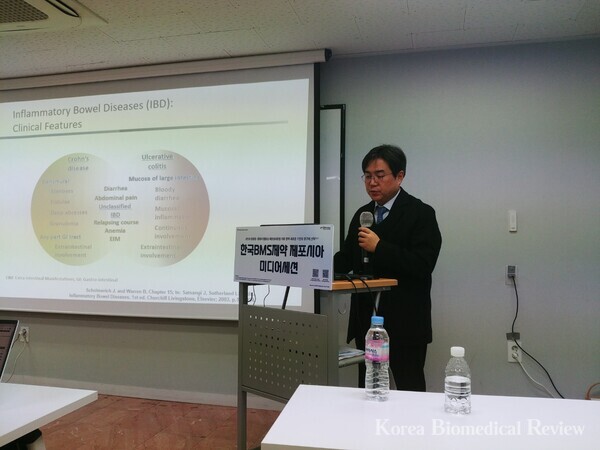Ulcerative colitis, an incurable condition demanding continual therapeutic oversight marked by recurrent remissions and relapses, was discussed by Cheon Jae-hee, Professor of Gastroenterology at Severance Hospital, during a BMS Korea's media session on Wednesday.

"Ulcerative colitis requires treatment to maintain a symptom-free state, even when there are no symptoms," Cheon said.
In the past, treatment options were scarce, and long-term follow-up was not possible, so steroids were used repeatedly, he went on to say.
Recently, however, biologics and small molecules treatments have been developed to treat patients who are refractory to or dependent on steroids.
In February, BMS Korea’s Zeposia (ozanimod), which modulates the S1P (sphingosine 1-phosphate) receptor in inflammatory bowel disease (IBD), won approval from the Ministry of Food and Drug Safety (MFDS).
S1P is a signaling molecule, and when S1P binds to the S1P receptor on lymphocytes, it causes the lymphocytes to leave the lymph nodes and travel to the inflamed tissue.
When lymphocytes travel through the blood to other tissues, they cause inflammation. Zeposia binds to the S1P receptor and degrades the receptor, thereby controlling inflammation.
Ulcerative colitis, a chronic, recurrent disease characterized by frequent inflammation or ulceration, is thought to be caused by an excessive immune response.
In recent years, the frequency of ulcerative colitis has been increasing rapidly due to the influence of Westernized lifestyles.
Therapies, including anti-inflammatory drugs, immunomodulators, biologics, and JAK inhibitors, have been used, but there are safety issues and decreased efficacy with long-term use.
Unlike existing biologics, Zeposia can be developed as a small molecule, allowing for once-daily oral administration and maintaining efficacy by not becoming immunogenic over the long term, the company said.
"Zeposia has a novel mechanism of action that is different from existing TNF inhibitors, interleukin inhibitors, and JAK inhibitors," said Cheon. "And it is safe because it does not alter the body's immune system."
Also, Cheon said that if a patient is elderly, has many comorbidities, or is concerned about severe infections, it may be difficult to use traditional biologics, and Zepocia is a safe treatment option that can be considered first in such patients.
"In addition, unless the patient has a severe or urgent need for symptom control, Zeposia may be an effective option for patients with high levels of activity because it is an oral medicine."

